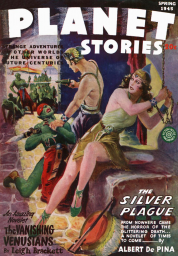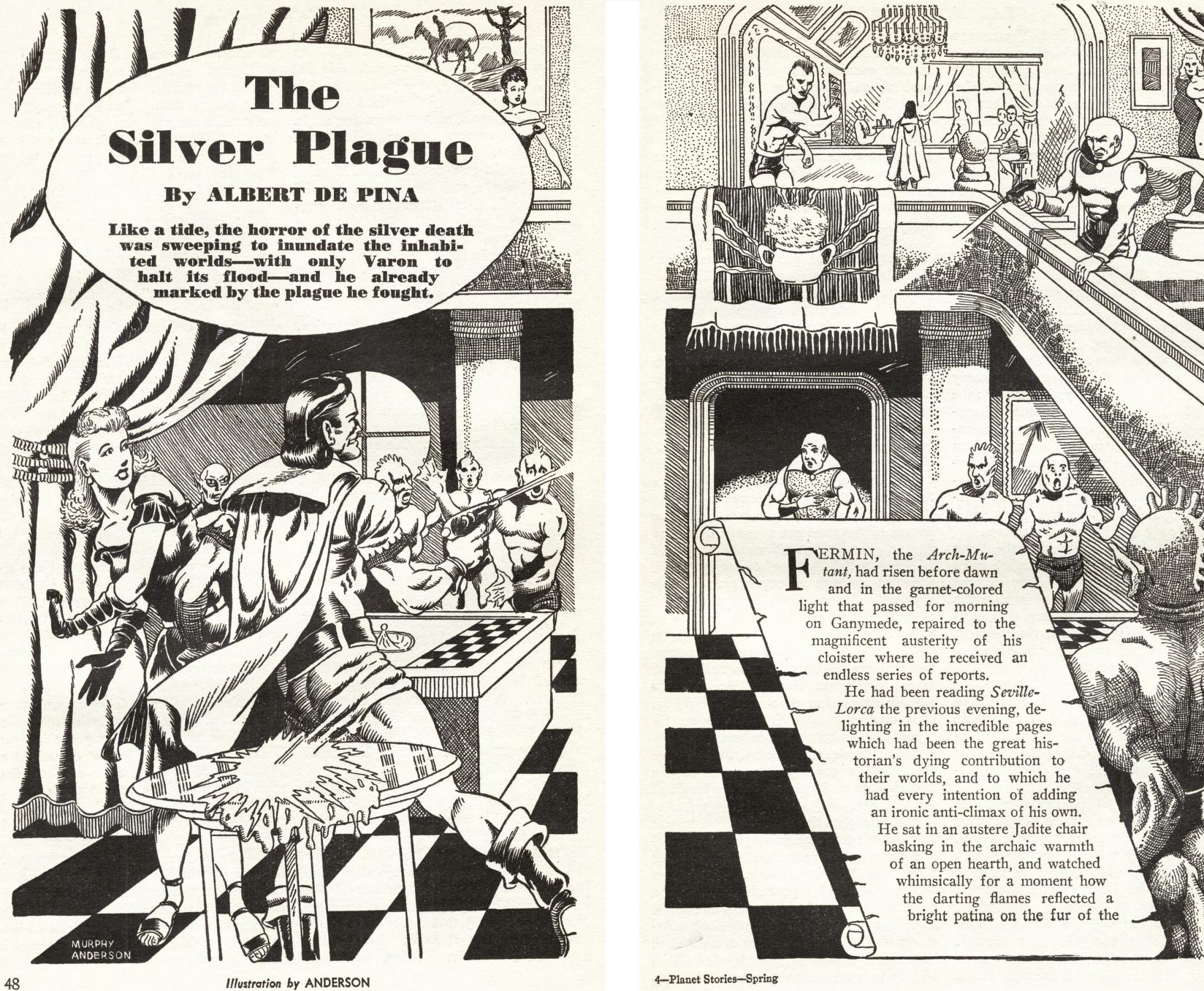Short Reviews – The Silver Plague, by Albert de Pina
Friday , 27, October 2017 Uncategorized 2 CommentsThe Silver Plague by Albert de Pina was the featured cover story of the Spring 1945 issue of Planet Stories. It can be read here at Archive.org.
 I’ve got to admit that I’m a little bit disappointed with The Silver Plague. Sharing the cover with Brackett as well as glowing accolades in subsequent issues’ letters section led me to hope for better from Albert de Pina. The Silver Plague is a story with mountains of potential that just fails to come together as a cohesive and coherent story.
I’ve got to admit that I’m a little bit disappointed with The Silver Plague. Sharing the cover with Brackett as well as glowing accolades in subsequent issues’ letters section led me to hope for better from Albert de Pina. The Silver Plague is a story with mountains of potential that just fails to come together as a cohesive and coherent story.
The idea is that wars on Earth created a race of albino Khan Noonien Singh-esque Mutant supermen whose intellect and self-determination put them at odds with a socialist global superstate, so said superstate booted them and other non-Mutant freethinkers off to the moons of Jupiter. The societies and states on the moons of Jupiter have a nominal perpetual peace, except they’re actually in a state of perpetual strife and intrigue acted out via agents. Honestly, the first comparison that came to my mind was Morrowind’s “House Wars”, in which the Great Houses present a united front while undercutting one another with disposable agents and sanctioned assassinations to maintain the façade that the province is not in a state of perpetual civil war. The hero of the Silver Plague is one such agent.
The Plague itself is an engineered viral agent that has been affecting the moon states (except for Ganymede, where the Mutants were resettled despite the presence of an existing native populace). The symptoms involve a physical transformation to those traits that mark the Mutants, however, one of the symptoms is sterility. While the victim comes to physically resemble the Mutants, true Mutants are able to reproduce.

We get an incredibly promising opening in chambers of the Arch-Mutant, who peruses a volume of history that contains this gem:
“For in a world devoid of want, where strife had ceased under scientific control, where obedience was taken for granted, and robot-labor performed an endless variety of tasks, the blessed Mutants found ways and means of fomenting discontent with admirable logic. Had it been confined to their own ranks, it would have been no problem at all, for as yet their number were negligible—scarcely a million. But the perversity of human nature is sometimes appalling to behold; thus, under the persuasive eloquence of the Mutants, great numbers of the population of the World State began audibly to long for freedom!
What manner of freedom they longed for, was a little difficult for the World Council to establish. For surely, in the face of universal plenty, freedom from want had been accomplished. Since the Government was a benevolent bureaucracy staffed by scientists, oppression was unknown. And, in the absence of need for labor, thanks to robots, anyone could and did pursue such bents and careers as best suited them, within certain limits. Even pleasure palaces; rejuvenation centers—and pleasures had been socialized. The Government furnished Cinemils, mild stimulants; even the more esoteric delights to all who performed a minimum of work per day.
Of course, we now know (thanks to three hundred years of perspective), what the World-State failed to perceive: That human beings need not so much ‘Freedom’ per se, as the ‘conditions of freedom.’ For in a Social Order where everything is provided without effort, effort itself is hopelessly circumscribed. Where the ‘Will to Achievement’ is subtly neutralized by an established way of life, that precludes ‘friction,’ such a ‘Will’ becomes atrophied and progress stagnant. Just as ‘resignation’ is an inadequate word to describe the psychic exhaustion of a wounded soldier who contemplates with indifference the immediacy of death. So is ‘exaltation’ insufficient to describe the spiritual change that came over large segments of the World-State under the fine ivory hands of the Mutants.”
Unfortunately, the ensuing story does little to capitalize on the promising introduction, and undercuts it by failing to provide sufficient motivation for the Mutants to sew discord among their libertarian-minded human brethren via the engineered plague.
You can tell that there are some interesting ideas that he wanted to explore with this one, but his overwrought prose, poor pacing and circuitous storytelling hamper what could’ve been an otherwise excellent thriller. He did a better job fleshing out his ideas about “the malcontents” around the Jovian moons in his first solo story, The Star Guardsmen, which makes me wonder if he was just overreaching in The Silver Plague. His subsequent and final story for Planet, Moon of Danger, is among my favorites from the magazine and put de Pina on my radar as an author to keep an eye out for. Sadly, de Pina was not particularly prolific—he had many excellent sci-fi ideas that, given more practice and some proper editorial guidance, could have made him a name to remember rather than a forgotten footnote of the pulp era.
Sounds like the story had potential. Poul Anderson used a somewhat similar scenario in his “Lunarian” novels of the ’90s.